Copacabana Blu-ray Movie
HomeCopacabana Blu-ray Movie 
Olive Films | 1947 | 92 min | Not rated | Apr 23, 2013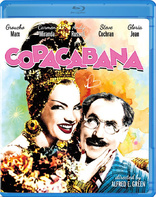
Movie rating
7.2 | / 10 |
Blu-ray rating
| Users | 3.0 | |
| Reviewer | 3.5 | |
| Overall | 3.0 |
Overview
Copacabana (1947)
Agent has his only client pose as both a French chanteuse and Brazilian bombshell to fool the nightclub owner.
Starring: Groucho Marx, Carmen Miranda (I), Steve Cochran (I), Maxine Fife, Gloria JeanDirector: Alfred E. Green
| Musical | Uncertain |
| Comedy | Uncertain |
Specifications
Video
Video codec: MPEG-4 AVC
Video resolution: 1080p
Aspect ratio: 1.37:1
Original aspect ratio: 1.37:1
Audio
English: DTS-HD Master Audio Mono
Subtitles
None
Discs
25GB Blu-ray Disc
Single disc (1 BD)
Playback
Region A (locked)
Review
Rating summary
| Movie | 3.0 | |
| Video | 3.5 | |
| Audio | 2.5 | |
| Extras | 0.0 | |
| Overall | 3.5 |
Copacabana Blu-ray Movie Review
Her name is not Lola.
Reviewed by Jeffrey Kauffman April 21, 2013The days of vaudeville were rife with what were called “specialty acts”, performers who had their own little niche carved out that didn’t fit into the more easily categorized definitions of singer, actor, comedian and the like. The Marx Brothers kind of straddled the line between “specialty act” and comedy act, especially since they had elements like Harpo’s miming and harp playing. Carmen Miranda came along significantly after vaudeville had declined to a mere shadow of its former self, but had she been around during vaudeville’s heyday, there’s little doubt that the so-called “Brazilian Bombshell” would have been yet another “specialty act”. The kind of sad thing about Miranda is that she was capable of so much more than most of her American films ever allowed her to display, and whatever else you can say about 1947’s Copacabana, it at least gives Miranda the chance to show some decent comedy chops along with her more typical fruit laden hat wearing song and dance numbers. Few people probably realize how successful Miranda had already been before she matriculated to the United States in 1939, and in fact her long and distinguished career in Brazil had resulted in enormous popularity both in films and on records. She was in fact Brazil’s most popular musical export until Sergio Mendes appeared in the sixties and stormed the pop charts with Brasil ’66. (Interestingly, Miranda’s longtime musical director was the iconic Dorival Caymmi, whose son Dori Caymmi later worked with Mendes and wrote Mendes’ stunning early hit “Like a Lover”.) Copacabana has been unfairly maligned through the years as a second rate pairing of a past their prime Marx and Miranda, but the film is still enormously entertaining, often quite funny and if not the best film that either of its stars ever made, certainly an enjoyable enough romp to merit revisiting.
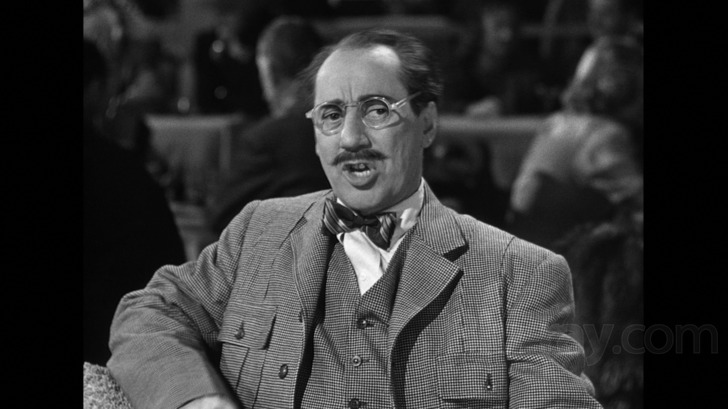
Those of you who are old enough to remember erstwhile Gomer Pyle, U.S.M.C. star Jim Nabors and his freakishly deep and operatic singing voice may well have something akin happen when you hear Miranda’s basso profundo speaking voice, something distinctly at odds with her chirpy singing style. It actually adds a considerable, albeit no doubt unintentional, amount of comedy to the proceedings throughout Copacabana. Miranda plays eponymous Carmen (Navarro), a singer-dancer from Brazil who has had the misfortune to hook up personally and professionally with one Lionel Q. Devereaux (Groucho Marx), a hustler without much talent who finally figures out he’d be better off representing Carmen as her manager rather than trying to book them as a duo act.
The rest of Copacabana plays out in a sort of lunatic farcical ambience that recalls some of the early Marx Brothers films, albeit without the general air of anarchy and insouciance that made those outings so instantly (and eternally) memorable. The film has some surprisingly snappy dialogue, courtesy of original Room Service co-author Allen Boretz. The film is awash in typical farce elements like mixed up identities and overly convoluted love triangles (even quadrangles), and also has a surfeit of silly sight gags.
While Lionel’s revelation that hawking Carmen might be the smarter career path for both of them, it in and of itself presents its own problems, especially when Carmen is presented to Copa club owner Steve Hunt (Steve Cochran), and Hunt immediately wants to see the rest of Lionel’s talent roster. Lionel’s halting attempt to use the racing forum doesn’t exactly pan out, but real life club vocalist Andy Russell (Russell had had several Latin tinged hits of his own throughout the forties) attempts to “help”, creating a fictional chanteuse on the spot named Fifi. Hunt expresses interest in Fifi, even more so than Carmen, leaving Lionel in a bind, until he sees a cigarette advertisement featuring a veiled woman. Suddenly, a masterstroke occurs to the always on the make Lionel: he’ll simply veil Carmen and pass her off as Fifi.
The rest of the film plays in a series of madcap episodes that sees Carmen becoming increasingly harried as she has to quickly change between her identity as well as that of Fifi, as well as Lionel chasing every skirt that comes within striking distance. Adding fuel to the farcical fire is Steve being attracted to Fifi and Steve’s comely secretary Anne (Gloria Jean) being attracted to Steve. It’s all patently silly, interspersed with several okay if not stellar musical numbers, but all of it delivered with a surprising amount of spunk by both Miranda and Marx.
From a musicological perspective, Copacabana offers some passing interest. The post-World War II era saw the sudden rise in popularity of a lot of “new” (to America) Latin rhythms, including a lot of Cuban music and other percussively driven offerings that would ultimately become homogenized as the “Exotica” movement in the fifties. The bulk of the song score here is by Sam Coslow whose ersatz contributions don’t quite have the vivacity that some of the “real” Latin tunes (like “Tico Tico”) have. I’d be remiss if I didn’t also include a brief word about director Alfred E. Green. His name may not be familiar to many of you, but he directed Bette Davis to an Oscar in Dangerous and had a hugely long and prolific career. Many of you who regularly read my reviews know that I spent many decades attempting to unravel the truth about classic actress Frances Farmer, and Green holds the distinction of having been the director who worked the most with the tempestuous actress during her brief Hollywood career, helming four of her features. Anyone who survived working with Frances Farmer certainly deserved a bit of a holiday on a lark like Copacabana. (Coslow actually wrote "Mr. Paganini", the fondly remembered comedy tune warbled by Martha Raye in Rhythm on the Range, a film which starred Farmer and Bing Crosby.)
Copacabana is often dismissed as having little of the wit and panache of the early Marx Brothers efforts and indeed some of Miranda’s Technicolor exotica. While that may be true, looking back on the film now from a perhaps less judgmental vantage point, it’s surprisingly zingy at times, with Marx and Miranda doing spectacular work as a long bickering couple. Miranda has some goofily endearing facial expressions throughout this film, as if her visage were made of silly putty, and both Miranda and Marx repeatedly break the fourth wall to visit asides to the audience. While the romantic complications here are largely forgettable, as frankly is much of the score (save for the wonderful rendition of “Tico Tico” Miranda offers early in the film), Copacabana has actually aged surprisingly well and may surprise even former detractors who may find unexpected comedic gems buried within an admittedly pretty tired general setup.
Copacabana Blu-ray Movie, Video Quality 
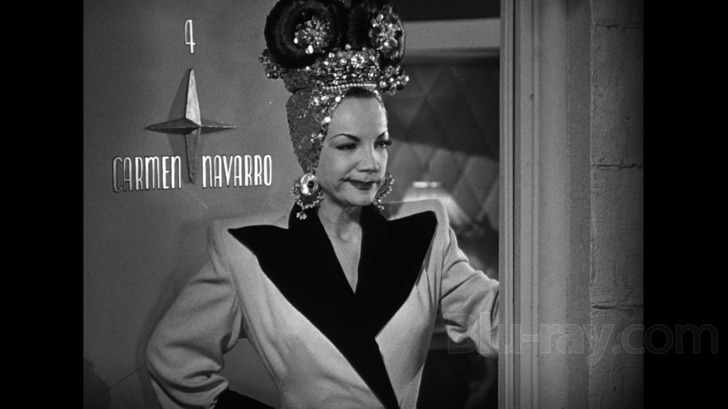
Copacabana is presented on Blu-ray courtesy of Olive Films with an AVC encoded 1080p transfer in 1.37:1. While the video quality here is by and large excellent, it is widely variable at times which may or may not rise to the level of annoyance depending on the individual viewer's tolerance levels. The vast majority of this presentation features really crisp contrast with well delineated gray scale and nicely modulated whites and blacks. The overall image is also very sharp and well defined. However, there are several places where the image suddenly becomes quite a bit softer and grainier, as if this were cobbled together from different sources. As with most Olive releases, there's no sign of any artificial digital tweaking having been done to the image, either in terms of noise reduction or sharpening.
Copacabana Blu-ray Movie, Audio Quality 
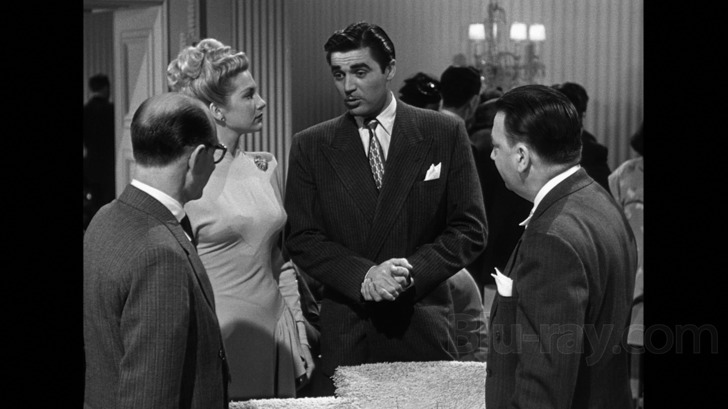
Unfortunately, Copacabana's lossless DTS-HD Master Audio Mono mix has to deal with some fairly damaged stems, including ubiquitous hiss and quite a bit of distortion throughout the film, especially in the midrange where it tends to especially affect the score, which often sounds "dirty" as a result. Perhaps surprisingly, dialogue fares at least a little better, though when there's no music, the hiss, as well as attendant scratches, pops and clicks become more noticeable. There's nothing here that makes the film actually unlistenable, but it's one of the more problematic tracks we've heard from Olive Films' Republic catalog releases lately.
Copacabana Blu-ray Movie, Special Features and Extras 
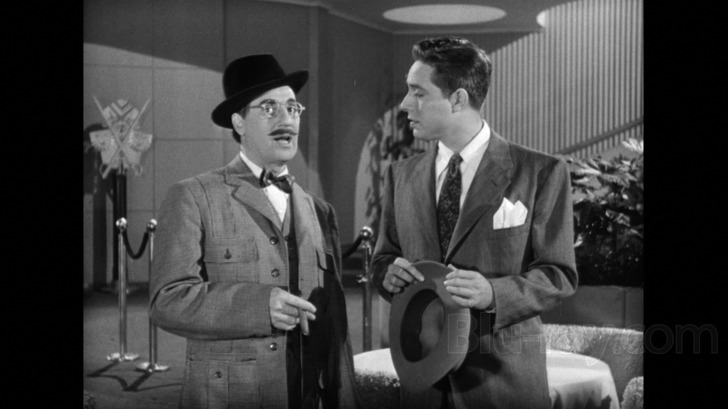
No supplements are offered on this Blu-ray disc.
Copacabana Blu-ray Movie, Overall Score and Recommendation 
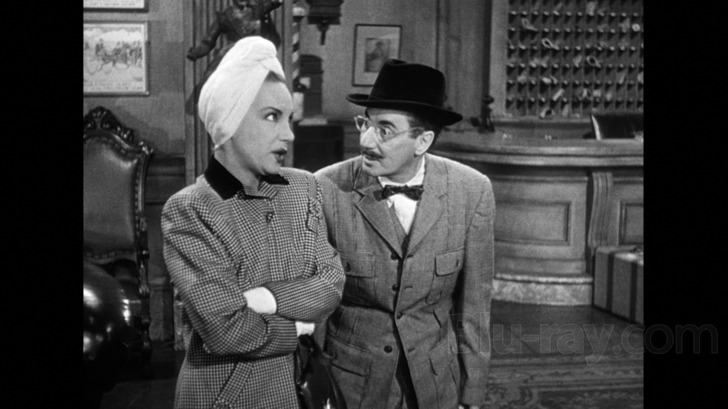
For those who have only heard of Copacabana, and probably in relatively disparaging terms at that, owe it to themselves to check it out at least once. The film is surprisingly funny, even if it's a little on the smarmy side at times given Groucho's leering presence. The musical elements here are fairly variable, but the film moves along at a blistering pace most of the time so that's little time to really dwell on any perceived shortcomings. This may not in fact be prime Marx or Miranda, but even second rate offerings by these beloved stars tend to outshine a lot of what else is out there available for mass consumption. This Blu-ray has occasionally problematic video and audio, but still (with caveats noted) comes Recommended.
Similar titles
Similar titles you might also like

Vox Lux
2018

Clambake
1967

Going My Way
75th Anniversary Edition
1944

Hair
1979

Blue in the Face
1995

She's Funny That Way
2014

The Honeymooners: "Classic 39" Episodes
1955-1956

Thank God It's Friday
40th Anniversary Edition
1978

The Blues Brothers 4K
45th Anniversary Edition
1980

Ricki and the Flash
2015

King of Jazz
1930

Little Sister
2016

The Girl Can't Help It
1956

She's Gotta Have It
1986

Biloxi Blues
1988

The Singing Detective
2003

Jack Goes Boating
2010

Monty Python Live (Mostly): One Down, Five to Go
2014

Lord of the Dance
Michael Flatley Returns
2011

Follow That Dream
Limited Edition - SOLD OUT
1962